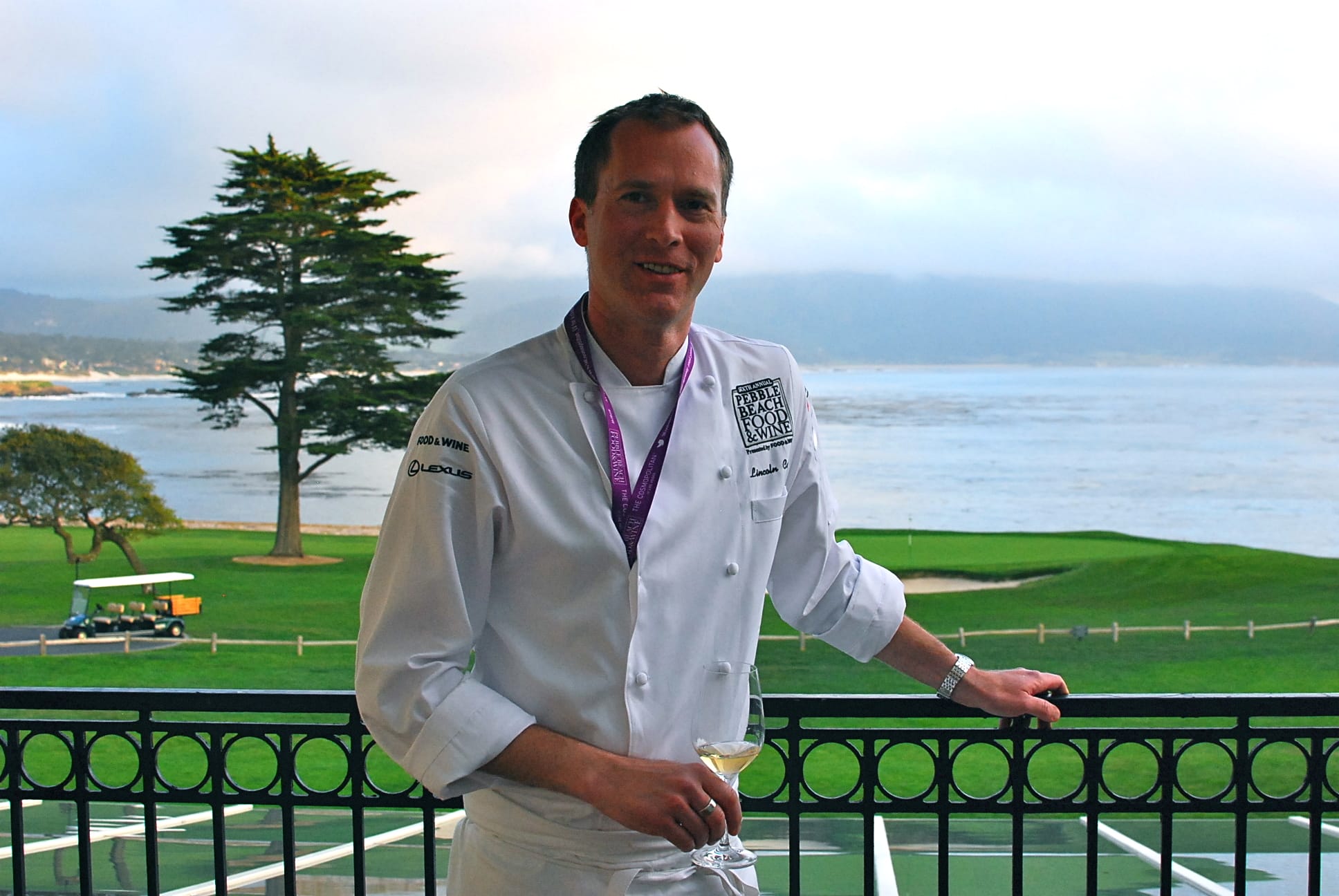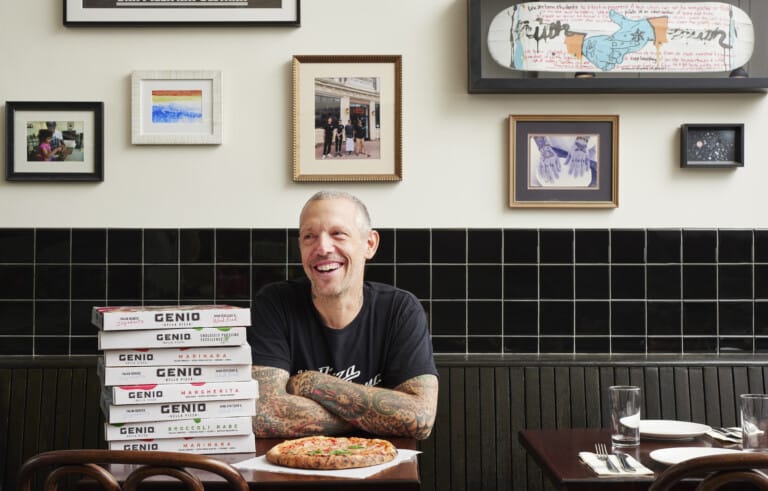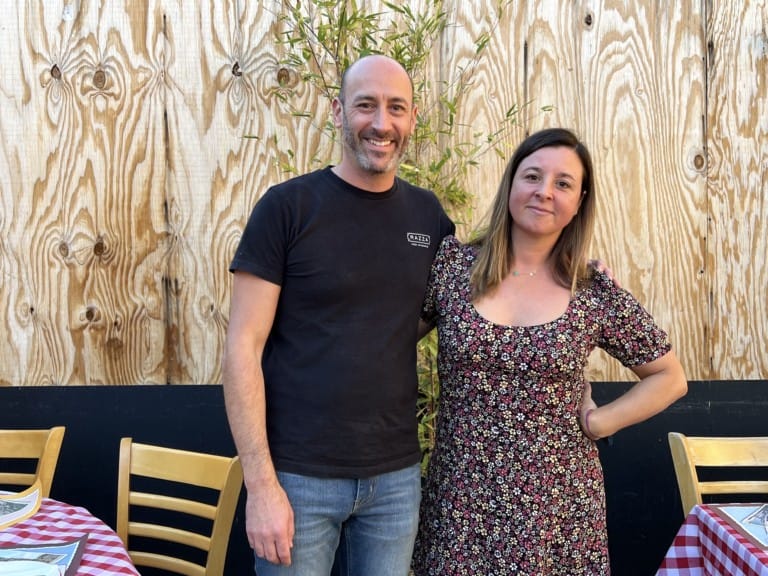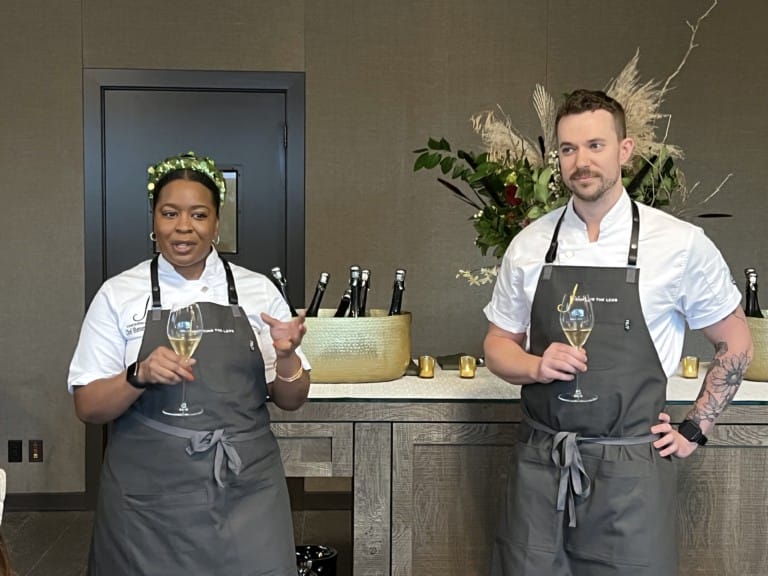INTERVIEW CONTINUED FROM PREVIOUS PAGE
JL: You’re involved in a number of concepts, in the restaurant group. Would you say that there are any common threads in what a Lincoln Carson dessert would be?
LC: Hopefully elegant, I think. Clean. I would like to think that we have a reason for everything. Not overly dramatic, but there’s always some drama in the plates. I think more so, for me, its about pairing the dessert menu to the restaurant, to the concept of the restaurant and the concept of the food. I mean RN74 is a great example. It’s a very French, wine biased style of restaurant, and I think what I might do at Bourbon Steak or Michael Mina, I wouldn’t even think of doing at RN. We have the same aesthetic in terms of clean flavors and as perfect of a technique as we can put together, hopefully beautiful.
JL: What was the most recent dessert that you developed and what was your inspiration?
LC: The dessert that we’re doing tonight…This one I really like a lot personally. It was based on something that came up for Valentine’s Day. At Michael Mina, we had done a paired menu, so 10 courses for each couple, each couple would get a different 10 courses. So for my theme, I went with white and red, and the Tiramisu in White is the white half of that component, and tonight’s dessert [red velvet cake], which I think is uber seasonal and really fits this time of year, was based more on a color than it was a set of flavors. Once I had the color [red] in my head I started to think about all the things that would fit with that, both thematically and flavor wise, and it kind of found this pretty quickly.
JL: What are the elements in the dessert?
LC: Red velvet cake, strawberries, rooibos, hibiscus, a port and balsamic gastrique, and there is a white element, we’ve got white chocolate and creme fraiche cremieux, which is a really supple, silky kind of ganache.
JL: So for contrast you have the white?
LC: For contrast and also for flavor, I think it was important. I could have colored it red but that really doesn’t make a lot of sense.
JL: Is there anything that you don’t enjoy eating?
LC: I don’t like sea cucumber, at least as I’ve had it. I pretty much enjoy everything if it’s done correctly, if it’s done well. I’m pretty easy. I like low brow, I like barbeque, but at the same time I’m really looking forward to go out to Atelier Crenn when I get back to the city.
JL: Dominique’s on the line with you tonight.
LC: Yeah. She’s amazing, I love her to death.
JL: What do you look for when you’re hiring someone to work in one of your kitchens?
LC: Mainly I hire on attitude. It’s really great to look at someone’s resume and say wow, they worked with some great restaurants of great merit, or that had a lot of buzz, or whatever. But I think attitude is the thing, you can’t teach people that. They need to have a really solid work ethic. It’s a hard job. I don’t hire people who don’t want to become pastry chefs, at least I try not to, and the people that do want to become pastry chefs, they need to put years into becoming one. I think finding people who have a thick enough skin that they can take criticism and understand that it’s not directed for any other reason than that they grow, and that they can get better, and finding people that are excited to be there. It affects the rest of the team, and if you have one team member who is devoid of energy or who doesn’t have the right attitude, it’s going to bring everyone else down. It’s important to me that we have, not only similar attitudes, but dissimilar levels of experience. I think it helps some of the more experienced cooks come up if they have someone to help mentor and bring along, and it obviously helps that cook as well. So you’re teaching both of them at the same time. I think if you have a whole bunch of rock stars at the A level, you’re not going to keep that team for very long.
JL: How do you gauge attitude? Are there certain questions that you ask or things you ask them to do in the kitchen?
LC: Well, we definitely bring them in for a trial. I think it’s important for them to see what the kitchen’s like, and what the expectations are, as it is for us to see them working. Obviously, I don’t want someone to come in and be wearing their food on their uniform. I don’t want people that are sloppy. I want people that are going to come in and ask what’s the next thing I can do, what else can I jump on, I have this I’m ready, or even better, “I screwed this up chef. What did I do wrong? I want people to own their work, both positive and negative, and own their mistakes. I’ve actually been having this conversation with one of my chefs, recently, and I think we’ve come to the decision that we’re now going to ask all cooks who are looking for a job, rather than just coming in to do a stage, I want them to come in and make something. It’s always been that we’ve thrown them into the slot, do this this and that, with whatever cook, and just kind of watch them through the day. I think I’m going to give them a specific task, maybe make a dessert for a family meal. And whether it’s a cookie or something really elegant, I don’t care, I want to see how they work and how they respond to that.
JL: What was the last meal you cooked at home?
LC: I’m trying to think of the last time I was at home. It was probably something similar to ratatouille, a little faster and dirtier, and quinoa.









Leave a Comment